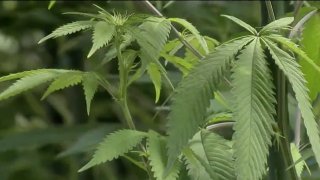
A compromise bill aimed at helping to grow the legal cannabis industry and making it more equitable emerged just before midnight Sunday after nearly a month of negotiations and quickly passed through both the House and Senate.
The bill (S 3096) aims to promote greater diversity in the legal marijuana industry, ratchet up oversight on the host community agreements that marijuana businesses are required to enter into with municipalities, and to lay the groundwork for cities and towns to green light on-site cannabis consumption establishments within their borders.
WATCH ANYTIME FOR FREE
>Stream NBC10 Boston news for free, 24/7, wherever you are. |
The bill would direct 15 percent of the money in the Marijuana Regulation Fund, which is where revenue brought in by the state's marijuana excise tax, application and licensing fees, and industry penalties is deposited, into a new Social Equity Trust Fund. That fund would offer grants and loans to boost participation in the cannabis field among populations disproportionately harmed by the War on Drugs. The House bill called for 20 percent and the Senate passed a bill dedicating 10 percent to the new fund; the conferees split the difference.
The bill would also give the Cannabis Control Commission the authority to review and approve host community agreements before a business obtains its final license, and clarifies that a community impact fee in an HCA cannot exceed 3 percent of gross sales and must be "reasonably related to the costs imposed upon the municipality by the operation of the marijuana establishment." HCAs would only be allowed for the first eight years a marijuana company is in business.
Get updates on what's happening in Boston to your inbox. Sign up for our >News Headlines newsletter.
Sen. Sonia Chang-Díaz, the Senate chair of the Cannabis Policy Committee, said the compromise bill "takes on some of the industry's biggest issues."
"It will re-balance the playing field where, so far, wealthy corporations have been able to buy their way through the licensing process and yet, too many local small businesses and Black and brown entrepreneurs have been locked out the of the industry," she said.
The conference committee report emerged in the Senate at 11:50 a.m. and was accepted on a voice vote at 11:58 p.m. It was accepted by the House a few minutes later, just after midnight. Procedural votes would get the bill to Gov. Charlie Baker's desk in the wee hours of Monday. The governor has said he hoped the bill would make it through the legislative process and onto his desk.
Local
In-depth news coverage of the Greater Boston Area.
"This conference report is a reflection of many meaningful conversations and debates about what it looks like to set the bar for good economic, regulatory and social policy in the new and rapidly growing cannabis industry in the commonwealth," Sen. Michael Rodrigues, the Ways and Means chairman and lead Senate conferee, said.
Rodrigues said the compromise bill also includes language addressing Section 280E of the federal tax code and the taxation of cannabis businesses.
"To ensure that cannabis businesses can thrive in the commonwealth, it decouples provisions of the Massachusetts tax law to allow cannabis businesses to deduct ordinary business expenses," he said.
Rodrigues said the conference committee decided to establish a study on "the use of medical marijuana in schools so that we can find a path forward for students that would greatly benefit from medical use marijuana as an accommodation."
Many of the issues addressed in the compromise bill were priorities for the Cannabis Control Commission, which for years has been asking the Legislature to give it the power to regulate HCAs and last year began urging the House and Senate to support a social equity fund for the growing industry.



